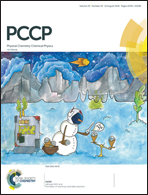How accurate are static polarizability predictions from density functional theory? An assessment over 132 species at equilibrium geometry†
Abstract
Static polarizabilities are the first response of the electron density to electric fields, and are therefore important for predicting intermolecular and molecule-field interactions. They also offer a global measure of the accuracy of the treatment of excited states by density functionals in a formally exact manner. We have developed a database of benchmark static polarizabilities for 132 small species at equilibrium geometry, using coupled cluster theory through triple excitations (extrapolated to the complete basis set limit), for the purpose of developing and assessing density functionals. The performance of 60 popular and recent functionals are also assessed, which indicates that double hybrid functionals perform the best, having RMS relative errors in the range of 2.5–3.8%. Many hybrid functionals also give quite reasonable estimates with 4–5% RMS relative error. A few meta-GGAs like mBEEF and MVS yield performance comparable to hybrids, indicating potential for improved excited state predictions relative to typical local functionals. Some recent functionals however are found to be prone to catastrophic failure (possibly as a consequence of overparameterization), indicating a need for caution in applying these.

- This article is part of the themed collection: 2018 PCCP HOT Articles


 Please wait while we load your content...
Please wait while we load your content...